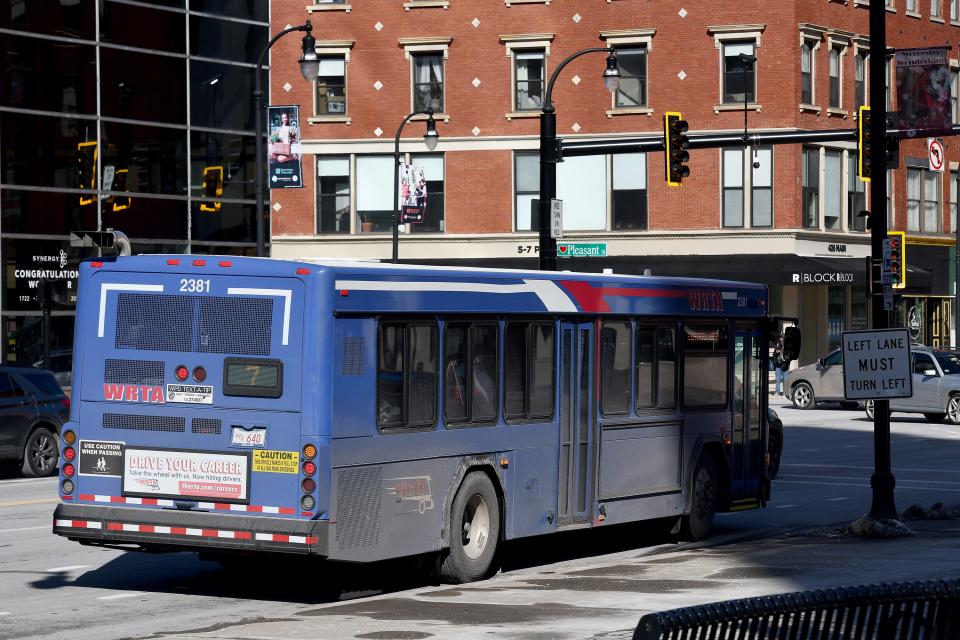State senators look to spend more on regional mass transit as report identifies deficits
Relying on public transit systems to get from point A to point B in Massachusetts can run the gamut from, "I’ll just hop on the T,” to “never can I ever get there from here,” depending on a traveler’s location within the state.

A new report on regional transit funding by the Center for State Policy Analysis at Tufts, paid for by The Health Foundation of Central Massachusetts, found the state’s public transportation system, particularly the regional transit authorities, to be fragmented and underfunded. They do not meet the needs of residents, especially those in more rural communities, the report states.
The report referred to the 15 regional transit authorities that cover routes outside of the greater Boston metropolitan area serviced by the Massachusetts Bay Transportation Authority as a “patchwork system," including the Worcester Regional Transit Authority.
The report calls for a more sustainable system and for greater equity in allocation of services as well as funding.
The transit authorities outside of metro Boston, according to the report, lack a dedicated and sustained source of state revenue and rely more heavily on subsidies from the municipalities they service. Communities lacking an extensive property tax base, due to lack of business and industry and more remote housing, pay a larger share for the transportation services.
Municipalities subsidize an average of 32% of regional transit authorities' operating costs, as opposed to 12% of the MBTA’s operating costs.
The report found that state funding is stagnant, based mostly on past allocations without consideration for increasing allotments for capital expenses including repairs, expansion of services, seeking to attract new riders to increase ridership or for electrification of its fleets.
The report also notes that the MBTA serving the greater Boston metropolitan area gets the lion’s share of state money. It also has a dedicated funding source; a portion of the state’s sales tax is directed to support the extensive underground and bus system.
The report also found holes in the state where communities are outside all regional transit authority service areas; those blank spots occur in both the state’s western rural reaches as well as sections close to the Connecticut border and even densely populated South Shore municipalities. The report also found that there is no linkage, no connections, between transit authorities serving adjacent communities.
“We must do more to eliminate transportation deserts, and to ensure that urban and rural residents alike have access to public transit, not only within each region but across a more connected system across the state,” said Dr. Amie Shei, president and CEO of The Health Foundation of Central Massachusetts. “Transportation is a public good and we must invest in it today so we can achieve the commonwealth’s climate, economic development health and housing goals tomorrow.”
In announcing the Senate fiscal 2025 budget last week, state Sen. Michael Rodrigues, D-Westport, said the proposed investment in regional authorities from the Fair Share Amendment, the Millionaire’s Tax passed by voters in 2022, reaches $120 million for operating assistance. The tax adds a 4% surcharge to all household income reported over $1 million.
The Fair Share funding is in addition to line items included in the body of the budget and brings the total investment in regional transit authorities to $214 million.
“The $214 million reflects a significant increase from Fair Share funds over our last budget,” Rodrigues said. The funds include $40 million to support fare-free initiatives throughout the systems as well as $10 million to enhance connectivity between services.
“The plan is to increase interconnectivity between RTAs; now you can’t get from Fall River to Brockton on the RTA,” Rodrigues said.
The report noted that there is little coordination between the different regional transit authorities; little integration with each other. It’s not a unified system, does not span the entire state and does not run consistently and without service interruptions depending on the day of the week and anticipated ridership.
Sen. Michael O. Moore, D-Millbury, is one of the senators supporting the increased funding included in the body’s proposed budget.
“With a record funding level of $214 million for FY25, if passed, this budget will represent an enormous investment in our regional transit authorities that allow us to offer expanded service, increased frequency and fare-free transit service,” Moore said. “By investing in our RTAs we’re choosing to bring more transportation options to individuals outside the MBTA system — something everyone should want.”
Ensuring transportation options for residents will enable greater economic development, an investment in bringing housing and jobs to areas outside of Boston, according to the report.
Regional transit authorities welcomed a program launched in fiscal 2024 that distributed $15 million for expansion and enhancement of existing services, to support connectivity between regional transit authorities and even support electrification projects. However, the report said there is no indication of continued funding.
The report concludes the state must provide a sustainable and constant funding source to regional transit authorities and foment cooperation between agencies.
The study was commissioned by the Quaboag Connector, a micro-transit initiative serving the residents of 10 rural communities west of Worcester and funded through a Synergy Initiative grant from the Health Foundation of Central Massachusetts. The Quaboag Connector is led by the Quaboag Valley Community Development Corporation and the Town of Ware. It has provided some 66,000 rides in the past years, serving as a “lifeline for local residents,” according to the report.
“Where residents live in Massachusetts should not determine their mobility or access to opportunity,” said Melissa Fales, executive director of the Quaboag Valley Community Development Corporation. “This report underscores the critical need to incentivize connectivity across RTA service areas, particularly in rural areas and to identify dedicated funding streams to support independent micro-transit efforts that are working to fill the gaps in transit across the commonwealth.”
This article originally appeared on Telegram & Gazette: Report identifies deficits in regional mass transit spending

